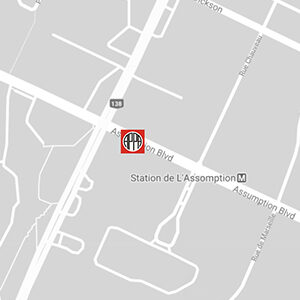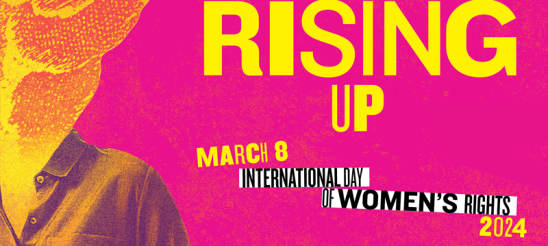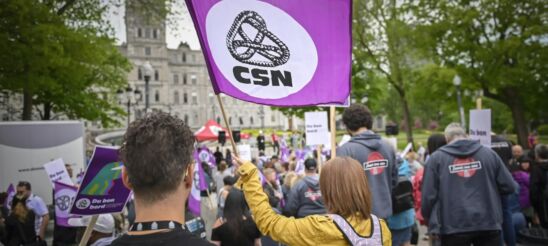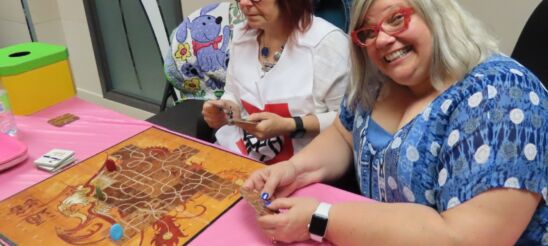The CSN slogan and visual for International Women’s Rights Day 2024 is: RISING UP. This powerful theme is inspired by the anger and indignation we feel in the face of the multiple crises shaking our society.
Dare to Give Campaign 2024
The APPA Status of Women Committee is daring you to donate your used bras in support of the Quebec Breast Cancer Foundation. Collect bras and compete against your fellow union members to win prizes! Your team has until May 3rd, 2024 to participate!
Unions demand pay equity in the Quebec public service
Thirteen years later, the Quebec Treasury Board has still not ordered a settlement of the pay equity complaints filed in 2010 on behalf of thousands of clerical and administrative employees.
List of Resources and Support for Women
List of crisis centres, support, healthcare and other social and community services available for women in the Montreal area.
If you or someone you know is in immediate danger, call 911 or your local emergency services (police, fire, ambulance).
Dare to Give Campaign 2023
The APPA Status of Women Committee is daring you to donate your used bras in support of the Quebec Breast Cancer Foundation.
Fundraising Board Game Night
Tuesday night’s special event raised nearly $1,100! It was a superb evening where fun, laughter and discovery of board games were on the agenda!
Dare to Give Campaign 2019
The APPA Status of Women Committee is daring you to donate your used bras in support of the Quebec Breast Cancer Foundation.
How to participate?
- Form a team of work friends and colleagues
- Register your team by using the form found by clicking on “More Information” below
- Create a bra donation box and place it outside your office
- Collect all the bras you can until Friday May 17th
For complete information, please click on “More Information” below.
Dare to Give Campaign 2018
Once again the APPA Status of Women committee has asked members to donate your used bras for the Osez le donner (Dare to Give) Campaign, and you certainly did! We collected a total of 480 bras from our CSDM and EMSB teams in our schools and head offices.
How Far Have We Come?
Working class women have continuously fought for higher wages and better working conditions. We have come a long way from the limitations on women’s jobs of the 19th century, but how far have we really come?
In the 1970’s women organized to demand equality in wages and working conditions and to increase their status in Canadian society. Women joined unions in greater numbers and gained considerable ground in forming laws prohibiting discrimination, sexual harassment, equal pay for equal work, maternity leave and benefits.
By the 1990’s, over 60% of families had both spouses employed while women earned approximately 31% of the household income. With the high cost of child care, approximately 60% of single-mothers lived below the poverty line.
Since the turn of the century, women have surpassed men in terms of education (making up over 60% of university graduates). Despite this, women still make 74 cents to every dollar that men earn and on average put in more hours than men in housework, child and elderly care.
As the government continues to cut back on services such as care for the disabled and elderly, high-paying jobs for women start disappearing, as women re-assume their traditional caregiving roles.
What’s next? We must continue fighting for equality, not only to eliminate the wage gap, but to turn how society views gender roles on its head.
A brief look at gender, occupation and salary at the EMSB
As public-sector workers, our union has continuously fought for pay equity. This hard work resulted in an increase of salary for most classifications in 2006 (retroactively to 2001), and again in 2011 for Office Agents Class II, Student Supervisors and Attendants for Handicapped Students. This has bumped up our hourly rates closer to similar occupations across the public sector, benefitting EMSB employees of all genders, but is it good enough?
Research into the APPA collective agreements from 2005 to 2020 finds some interesting revelations about gender, job type and salary.
As of 2015, women make up 89 % of all APPA employees at the EMSB. It is well known that there has always been a much greater number of women than men. However, men hold a larger variety of jobs than women and occupy most of the highest paying classifications such as Data Processing Technician Principal Class and Building Technician.
Although women are not discouraged from obtaining these higher-paying jobs, these classifications are highly specialized, requiring a CEGEP diploma in their related fields. Historically, fewer women than men have pursued these career paths, but as more young women earn diplomas in technology and construction, we hope to see a more balance in these positions in the future. This is already occurring in other technical and paratechnical classifications such as Data Processing Technician and Data Processing Operator.
Why is it then, do some occupations have a higher salary than others requiring the same amount of education and/or experience? Studies suggest the reason for this discrepancy is that society values traditionally male occupations over traditionally female occupations.
On the other hand, there are almost no men working in support positions, such as Secretary, Daycare Educator or Office Agent. As traditionally female, these are typically lower paid classifications even though they are evolving to become increasingly more complex. In other industries, the number of men applying for secretarial positions has increased, however, we have not yet seen an increase in male support staff positions at the EMSB in 10 years.
The question is, why? Are men reluctant to apply to a traditionally female occupation? Is there a stigma towards men working with young children? Do they fear being negatively labeled as a result? Are men being discriminated against during the hiring process?
These obstacles are preventing gender balance within our union, which in turn, possibly prevents true pay equity as well.
The solution? Think out of the box. Acknowledge that both men and women are equally capable of working in any classification. Abandon the traditional model of male and female occupations. Value the individual’s skill set and promote gender diversity across all job classifications.
For more information, numbers and graphics, click on “More Information” below.
Sources:
APPA Collective Agreements 2005-2010, 2010-2015, 2015-2020
APPA Seniority Lists 2005, 2010, 2015
http://www.thecanadianencyclopedia.ca/en/article/women-in-the-labour-force/
https://www.nytimes.com/2016/03/20/upshot/as-women-take-over-a-male-dominated-field-the-pay-drops.html
https://www.theglobeandmail.com/report-on-business/careers/business-education/gender-stereotyping-of-work-roles-hurts-both-women-and-men/article36091414/








